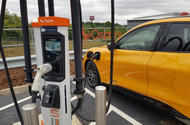Three of the UK’s biggest charging firms, including Osprey, say their prices are as low as they can go
New data released by the RAC reveals public charger prices have risen by more than 50% in just eight months
It now costs more to run an electric car using public rapid chargers than it does its petrol equivalent, new data has revealed, with charging prices having risen by more than 50% in just eight months.
Yet when approached by Autocar, three of the UK’s biggest electric charging firms say they are setting prices as low as they can, and one campaign group has called on the government to cut VAT on public chargers to help those without access to a home charging port.
RAC data, released today, shows that since May the average price of using a rapid charger – that has a power output up to 50kW – has risen by 58% from 44.55p per kWh to 70.32p. This means charging a family-sized, 64kWh car such as the Hyundai Kona from empty to 80% costs £36, enough to cover around 188 miles.
This is more than the 47% rise seen in the price of using ultra-rapid chargers (power outputs up to 100kW), which has shot up from 50.97p per kWh to 74.49p, resulting in a 0-80% fill-up cost of £38.39.
The RAC data shows that those charging from a slower home charger are paying just £17.87 for the same 188 miles of range.
To compound the numbers, the group’s fuel calculator shows running the 1.0-litre mild-hybrid petrol version of the Kona would also be cheaper than its EV sibling relying solely on public fast chargers. A 188-mile fill-up would, with current forecourt prices set at an average of 155.11p per litre of unleaded petrol, cost £33.
It also reveals that getting the equivalent 484 miles of a fully fuelled 55-litre petrol car – such as the Volkswagen Golf – would cost £9.61 more (£92.69) for a 64kWh EV (which would be over multiple stops, given a battery of that size would only provide a maximum of 245 miles of range, depending on the car and the conditions).
This has prompted national campaign group Faircharge, backed by the RAC, to call on the government to cut VAT on public chargers from 20% to 5%, mirroring the rate that domestic energy users pay. Doing so would see the cost of rapid charging falling by 8.79p per kWh (to 61.53p) and ultra-rapid charging by 9.35p (to 65.44p).
Not doing so would “risk dissuading potential electric car owners from making the switch”, the group added, despite a record number of EV registrations last year (267,203) leaving electric as the second-most-popular powertrain only to petrol (682,473).
“While affordable home charging remains a real incentive for British drivers to go electric, we remain concerned that the small but significant proportion of drivers without access to private parking are doubly disadvantaged by more expensive charging costs and an added tax burden,” said Faircharge founder Quentin Willson.
“This archaic VAT policy means that those without home charging pay four times the rate of tax as those charging at home. The government should set this right, not simply out of sheer unfairness but also to ensure public charging remains an affordable option for all drivers as we seek to bring down air pollution and decarbonise our roads.”
Despite the call, some of the UK’s biggest public EV charging firms claim their prices are as low as they can be.
Gridserve, which charges among the lowest at up to 66p per kWh, told Autocar that it has “worked hard to ensure that our pricing remains competitive” while still keeping it affordable.
Another, Ionity, is a joint venture between BMW, Ford, Hyundai, Volkswagen and Mercedes-Benz, which itself last week announced plans to launch a global network of 350kWh charging hubs. Ionity charges 69p per kWh, and claims to have not changed its prices since 2020.
Speaking about future pricing, a spokesperson told Autocar: “Due to the general geopolitical and economic conditions, it is difficult to make forecasts for 2023. We are closely monitoring the developments. Our aim is to provide customers with competitive offers.”
Osprey, one of the most expensive charging networks at 79p per kWh, hit headlines in October by backtracking on a price hike to £1 per kWh that caused a public outcry. It told Autocar that as “in most cases EV drivers charge their vehicles across residential, workplace and public charging locations”, the “true cost of driving electric is still cheaper overall than driving a petrol or diesel vehicle”.
Asked if high costs would affect EV uptake, Osprey added: “As the recent record registration numbers have shown, especially in key sectors such as fleets, we are not concerned that there will be an enduring effect.”
Source: Autocar
